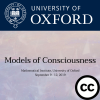Quanlong Wang - Modelling consciousness divisions in ZW-calculus
Quanlong Wang
Department of Computer Science, University of Oxford
Natural science has a basic assumption that there exists a kind of objectivity in the world independent of any consciousness. But how could one verify such objectivity given the fact that human beings can only perceive any existence through their own consciousness? On the other hand, there is a possibility for the existence of pure consciousness which could support the appearance of all phenomena, as claimed by the Yogācāra school of Indian philosophy. Based on this philosophy, any consciousness consists of two divisions: the perceived division (nimittabhaga in Sanskrit) and the perceiving division (darsanabhaga in Sanskrit). The perceiving division can recognise the information presented by the perceived division, they interact with each other as a whole unity. It is based on these two divisions that objectivity and subjectivity are established.
In this talk, we give a mathematical model for characterising the interacting processes between the perceived division and the perceiving division within the framework of ZW-calculus, which is a graphical language representing quantum processes in compact closed categories. We expect that using this model some key interacting processes between the perceived division and the perceiving division can be characterised, which then paves the way for further research on modelling consciousness.
Filmed at the Models of Consciousness conference, University of Oxford, September 2019.




